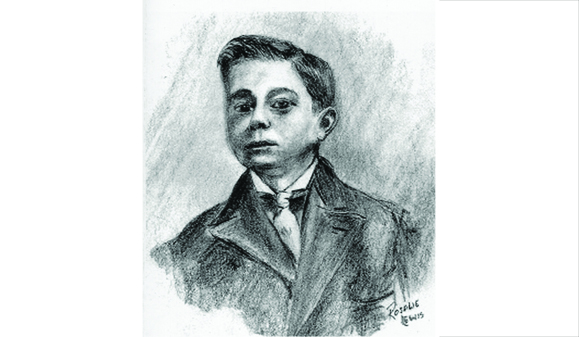John J. Callahan was one of fifteen boys who arrived in Philippi, West Virginia, on an Orphan Train. It was on June 24, 1903. He was taken by C.K. Switzer, owner of a flour mill in Mansfield, now an addition of Philippi. After living with the Switzers for a time, John let it be known that he was fond of horses and wanted to live on a farm.
My grandfather, Ai Cleavenger, had a large cattle farm just seven miles from Philippi. He took John and made him a member of the family and gave him a horse. John called Ai “Dad” and grew up as a brother of Ai’s only daughter, Sadie.
The family albums have many photos of John as a child, riding his horse, posing with the family, and in his uniform after he joined the army and with his wife, Ethyl, whom he married while in the service.
My mother, Sadie, told me that John was an orphan, (explaining why his last name was different), but never mentioned other details of his background.
He was always Uncle John to me and I looked forward to the summers when he and Ethyl came home for vacation. They made their home in Elmont, New York, where John worked for a milk company. They never had children.
Uncle John was a wonderful storyteller. When he was saddling my pony he told me he once had a black horse with freckles. He used him to pull his milk wagon. Every morning at four a.m. he awoke the horse, harnessed him to the wagon and started his rounds. The last customer got his milk for breakfast at 8:00 a.m. There were fascinating stories about his customers. John would describe some of them in such detail that I almost knew them. One lady left notes in the empty bottles. He would stretch his fingers and unfold the note as if he were holding a strip of paper and pretend to read. Then I would giggle and he would roar with laughter.
When Uncle John and Aunt Ethyl came they always brought something for me. Most of the time it was a souvenir of something special from New York. Once, I remember, I was given a small Statue of Liberty. As usual, John brought it to life with a story of his step-by-step climb to the “real” Statue of Liberty. He explained in detail the view from the torch and then told me he slid down the banister all the way back.
My favorite gift was one he asked my mother to put away for my twelfth birthday, which was in December. Ethyl had wrapped it in Christmas paper and wrote “Happy Birthday and Merry Christmas.” When my mother gave it to me I could hardly wait to open it. I ripped the paper open to find a yellow tin can with the words FRESH MARSHMALLOWS on it. When I took the lid off, a long green covered thing jumped out and flew across the room scaring me out of my wits.
Just recently I read an article in our local newspaper entitled “The Day They Gave The Kids Away.” My eyes filled with tears and my heart ached when I saw John’s name. He was one of the Orphan Train Riders.
Ethyl preceded John in death. When Uncle John passed away his personal belongings were sent to us. I have their photo albums and their scrapbook. This book shows me a lot about their interests. There are letters from congressmen to whom they had written, letters from pastors from churches they had attended, and many other responses from their community activities.
Now that I know about the Orphan Train Riders, my favorite photo of Uncle John is his first studio portrait after he came to live with my grandfather. He was around thirteen and his memories of the orphanage and the Orphan Train were still fresh in his mind. He was a handsome boy, as he was later as a man, when I knew him.
John’s kindness and his wonderfully funny stories were an important part of my childhood. Now I know why he never told me about the orphanage or the Orphan Train. They certainly were no laughing matter.


Leave a Reply